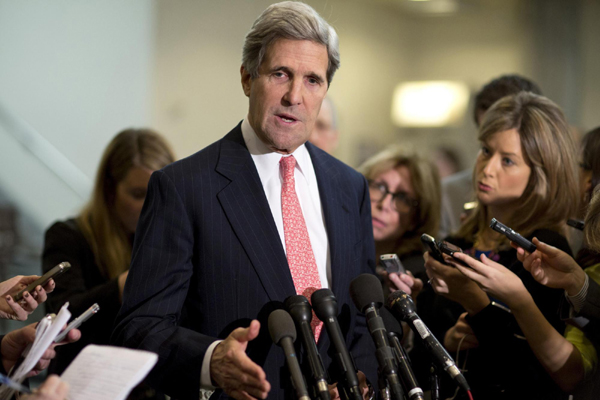Kerry selection bodes well
By Chen Weihua in New York (China Daily) Updated: 2012-12-23 07:47China hands in the United States interpreted President Barack Obama's nomination on Friday of Massachusetts Senator John Kerry for secretary of state as a positive sign for Sino-US relations.
Bonnie Glaser, a senior fellow with the CSIS Freeman Chair in China Studies, said Kerry has had significant experience dealing with Asia in general and China in particular.
 |
|
US Senator John Kerry (D-MA), Chairman of the Senate Foreign Relations Committee, speaks to reporters about the attack on the US consulate in Benghazi, on Capitol Hill in Washington, in this file photo on Dec 19, 2012. [Photo/Agencies] |
"He has visited China many times. I think he has a very good grasp of all the issues that fall under US-China relations," Glaser said. "So there is already some good groundwork for the two countries to work together."
Steve Orlins, president of the National Committee on United States-China Relations, said as chairman of the Senate Foreign Relations Committee, Kerry understands China.
"He has had a fairly positive and constructive view of US-China relations. I believe his appointment as secretary of state will certainly maintain the relationship and has the possibility of improving the relationship," Orlins said.
Meanwhile, Cheng Li, director of research and a senior fellow at the John L. Thornton China Center in the Foreign Policy Program at Brookings, believes Kerry's approach to China will differ somewhat from his predecessor Hillary Clinton, who is expected to step down in January.
He will place more emphasis on cooperation with China, rather than uniting other Asian nations against it, Li predicted.
Kerry will also be able to better explain US policy on China to Congress, Li said, adding that Kerry has met Chinese leaders such as Xi Jinping and Li Keqiang and established good relationships with them.
Kenneth Lieberthal, also a senior fellow in foreign policy at Brookings and a former special assistant to the US president on national security, emphasized the respect Kerry commands in the Senate.
"It's not a requirement for the position but it's always helpful because a lot of decisions on Capitol Hill could have an impact on US foreign policy," he said.
Lieberthal said that privately Kerry feels politics is the art of the possible. "So if you want to understand what can be done, you've got to not only understand what your own interests are, but to understand the interests of the other side."
"I would think that bodes well for him being an effective secretary of state, as well as in dealing with China," Lieberthal said.
"He has no clear record in terms of the issues we now confront with China, especially the bilateral issues, but he is someone who will handle things in a very professional way," he said.
Lieberthal cautioned Kerry would be reading from the same page as the US president.
"Ultimately President Obama makes policy on China," he said.
Orville Schell, director of Asia Society's Center on US-China Relations described Kerry as part of the "best tradition of level-headed, well-informed and judicious American foreign policy leaders".
"He speaks fluent French, has traveled widely and understands the evolving world. Although he does not know China well, he has a keen sense of its importance in our 'new world' and to the US," Schell said.
"While he will be a welcome voice of reason and pragmatism, should he become secretary of state, he will, like Hillary Clinton, also be someone with a keen sense of American values."
In a speech to the Senate in October 2011, Kerry said: "China is an important partner of the United States in a lot of ways. It's also a major investor in the United States. So I don't think we are here to rupture that relationship. I think we are here to send a message to the Chinese about the urgent need to repair it."
In announcing his nomination on Friday, Obama described Kerry as someone who knows well the "responsibility to use American power wisely, especially our military power."
chenweihua@chinadaily.com.cn






